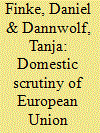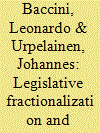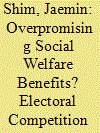|
|
|
Sort Order |
|
|
|
Items / Page
|
|
|
|
|
|
|
| Srl | Item |
| 1 |
ID:
165598


|
|
|
|
|
| Summary/Abstract |
How is the use of political lotteries related to party development? This article discusses the effects of a lottery-based procedure used to distribute committee appointments that was once common across legislatures in nineteenth-century Europe. The authors analyze the effects of a political lottery in budget committee selection in the French Third Republic using a microlevel data set of French deputies from 1877 to 1914. They argue that the adoption and benefit of lottery-based procedures were to prevent the capture of early institutions by party factions or groups of self-interested political elites. The authors find that partial randomization of selection resulted in the appointment of young, skilled, middle-class deputies at the expense of influential elites. When parties gained control of committee assignments in 1910, selection once again favored elites and loyal party members. The authors link lottery-based procedures to party development by showing that cohesive parties were behind the institutional reform that ultimately dismantled this selection process. Lottery-based procedures thus played a sanitizing role during the transformation of emerging parliamentary groups into unified, cohesive political parties.
|
|
|
|
|
|
|
|
|
|
|
|
|
|
|
|
| 2 |
ID:
123009


|
|
|
|
|
| Publication |
2013.
|
| Summary/Abstract |
Some European law proposals are subject to scrutiny by national parliaments while others go unchecked. The analysis in this article indicates that the opposition scrutinises European Union law to gather information on the proceedings inside the Council of Ministers and the European Parliament. Yet whereas strong opposition parties scrutinise highly politicised law proposals, weak opposition parties tend to scrutinise those proposals that are negotiated under the non-transparent fast-track procedure. In addition, there is ample evidence that the leading minister initiates scrutiny in order to strengthen his or her intergovernmental bargaining leverage. Yet, this Schelling Conjecture presumes that the party of the minister is located between the expected bargaining position in the Council and the coalition partner. Any other domestic interest constellation could lead to scrutiny motivated by whistle blowing. However, an issue's salience helps us to separate the whistle blowing from the Schelling Conjecture.
|
|
|
|
|
|
|
|
|
|
|
|
|
|
|
|
| 3 |
ID:
110543


|
|
|
|
|
| Publication |
2011.
|
| Summary/Abstract |
The development and elaboration of the spatial theory of voting has contributed greatly to the study of legislative decision making and elections. Statistical models that estimate the spatial locations of individual decision-makers have made a key contribution to this success. Spatial models have been estimated for the U.S. Congress, the Supreme Court, U.S. presidents, a large number of non-U.S. legislatures, and supranational organizations. Yet one potentially fruitful laboratory for testing spatial theories, the individual U.S. states, has remained relatively unexploited, for two reasons. First, state legislative roll call data have not yet been systematically collected for all states over time. Second, because ideal point models are based on latent scales, comparisons of ideal points across states or even between chambers within a state are difficult. This article reports substantial progress on both fronts. First, we have obtained the roll call voting data for all state legislatures from the mid-1990s onward. Second, we exploit a recurring survey of state legislative candidates to allow comparisons across time, chambers, and states as well as with the U.S. Congress. The resulting mapping of America's state legislatures has great potential to address numerous questions not only about state politics and policymaking, but also about legislative politics in general.
|
|
|
|
|
|
|
|
|
|
|
|
|
|
|
|
| 4 |
ID:
112887


|
|
|
|
|
| Publication |
2012.
|
| Summary/Abstract |
This article shows that legislative fractionalization and leftward (but not rightward) partisan shifts increase the volatility of public R&D expenditures in new energy technologies. We develop a highly accurate estimator for public energy R&D expenditures, and examine deviations from the estimated values using data for member states of the International Energy Agency, 1981-2007. Given that unpredictable fluctuation in public spending on new energy technology reduces the positive effect of such spending on innovation, our empirical analyses imply that countries with fractionalized legislatures can improve the performance of their energy technology programs by enacting institutional mechanisms that reduce the volatility of public spending. Similarly, the results indicate that left-wing and right-wing governments can improve the performance of public technology programs through agreements that distribute gains in such a fashion that partisan shifts do not cause spending cuts. Contravening the conventional wisdom, we also find that public energy R&D is unusually stable in the United States.
|
|
|
|
|
|
|
|
|
|
|
|
|
|
|
|
| 5 |
ID:
184759


|
|
|
|
|
| Summary/Abstract |
Drawing insights from legislative, electoral and welfare studies, the article investigates whether and to what extent electoral competition affects incumbent politicians’ overpromising of social welfare benefits. For this, Taiwan is chosen as the case and the article examines the fate of elite-level social welfare legislative proposals in the period between 1992 and 2016. Findings drawn from quantitative bill sponsorship patterns demonstrate that political elites tend to propose failure-prone social welfare bills during election periods. Moreover, this tendency grew even more clearly in tandem with the rising levels of electoral democracy. The article argues that the overpromising of social welfare benefits is likely due to cognitive biases on the voter side allowing politicians to make promises without necessarily facing the negative consequences of under-delivery. The article contributes to the comparative welfare state literature by adding much-needed nuance to the existing debates on the relationship between democratic deepening, electoral competition, and the development of welfare politics.
|
|
|
|
|
|
|
|
|
|
|
|
|
|
|
|
| 6 |
ID:
174449


|
|
|
|
|
| Summary/Abstract |
Roll-call votes provide scholars with the opportunity to measure many quantities of interest. However, the usefulness of the roll-call sample depends on the population it is intended to represent. After laying out why understanding the sample properties of the roll-call record is important, we catalogue voting procedures for 145 legislative chambers, finding that roll calls are typically discretionary. We then consider two arguments for discounting the potential problem: (a) roll calls are ubiquitous, especially where the threshold for invoking them is low or (b) the strategic incentives behind requests are sufficiently benign so as to generate representative samples. We address the first defense with novel empirical evidence regarding roll-call prevalence and the second with an original formal model of the position-taking argument for roll-call vote requests. Both our empirical and theoretical results confirm that inattention to vote method selection should broadly be considered an issue for the study of legislative behavior.
|
|
|
|
|
|
|
|
|
|
|
|
|
|
|
|
|
|
|
|
|